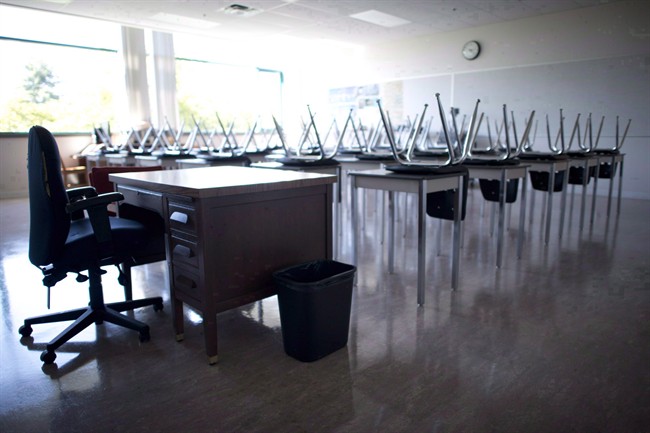TORONTO – An education advocacy organization says students deemed to have special needs are increasingly being asked to stay home from school in Ontario rather than remain in class with their peers.

The annual report from People for Education does not speculate on the cause of the trend, which it began documenting in 2014 after hearing anecdotes from parents.
In that four-year period, however, the organization noted an increase in the number of elementary and secondary school principals who report recommending a special education student stay home for at least part of a day.
READ MORE: Ontario schools with well-educated parents more likely to offer child care programs, report finds
Of the more than 1,200 principals surveyed this year, the organization found 58 per cent of elementary school heads and 48 per cent of high school principals made the request, up from 48 per cent and 40 per cent respectively in 2014.
The majority of the principals surveyed cited safety as the primary reason, with others saying they do not have adequate resources to address students’ needs.
Inclusive education researchers say the trend is not unique to Ontario, adding factors such as inadequately deployed resources or poor attitudes toward special-ed students may also be at play.
People for Education’s executive director, Annie Kidder, said the results are especially striking given that the amount of provincial funding directed towards special education initiatives has climbed by $1 billion over the past 10 years.
“We can glean from this that there is a problem in terms of the amount of support that’s there for kids who may have a higher level of special education needs,” Kidder said in an interview.

Get breaking National news
“Not just in terms of how many people are there, but also their capacity to provide these supports.”
Kidder said the organization first began watching the issue after a growing number of parents began reporting that they’d been asked to either pull their children out of school early or keep them home altogether.
The principals surveyed on the issue come from 70 of Ontario’s 72 publicly funded school boards.
Of those surveyed, 73 per cent said the student was being kept away from class out of concern for safety. Kidder said the respondents did not indicate whether that safety concern was for the student in question, that student’s peers or the education workers.
But some survey responses shed some light on the situation.
“If I have asked a parent to keep a student home it is almost always related to safety (the student runs, hits self/peers/ adults, or vandalizes the space he/she is in),” one elementary school principal said.
Kidder said the current system is evidently struggling to cope with the growing number of students receiving special education services. The current report found 17 per cent of elementary students and 27 per cent of secondary students currently qualify for such services, figures that are nearly twice as high as those reported in 2000.
Gordon Porter, Director of Inclusive Education Canada, said capacity is a growing challenge as schools try to accommodate students who might at one time have simply have been discouraged from pursuing an education.
But he said the trend of sending students home raises red flags regarding attitudes toward students with disabilities or different educational needs.
“The culture of school is you come, you work hard, you do well academically and you behave well,” he said, describing the safety justification as a simple solution to a more complex problem. “Anybody that doesn’t quite do that is immediately seen as a problem to be managed. There’s a stigma that goes with kids that have more complex needs, and I think we have to get rid of that stigma.”
Jacqueline Specht, Director of the Canadian Research Centre on Inclusive Education at Western University, said the survey findings echo recent research exploring high levels of disabled exclusion from both the academic and extra- curricular aspects of the education system.
She said similar trends are in evidence across Canada, adding that simply increasing special-ed funding or hiring more staff would not address the problem.
READ MORE: 70% of Ontario elementary educators surveyed have seen or experienced classroom violence, union says
The bulk of resources need to be directed toward supporting classroom teachers and giving them training and tools to help keep special ed students in class, she said. Those resources, she added, need to be deployed early.
“I think that just really does speak to the bigger picture of needing to support our schools in how to work with the children before these behavioural issues arise,” she said.
“To really stop things from happening rather than reacting when they do happen.”
Early interventions form the bulk of People for Education’s recommendations on the issue. The organization urged the incoming Progressive Conservative government to increase resources to educators in kindergarten and the early grades, as well as ensure that students needing support get it as soon as possible.
Representatives for premier-designate Doug Ford did not respond to request for comment.
Other issues flagged in the report include work load for school principals, the disparity of resources between urban and rural schools, and staff concerns about student mental health.







Comments